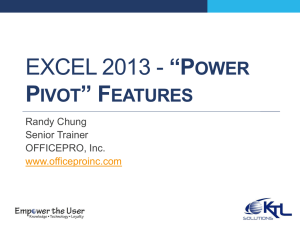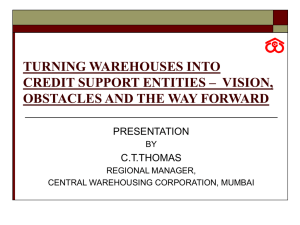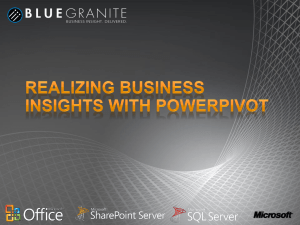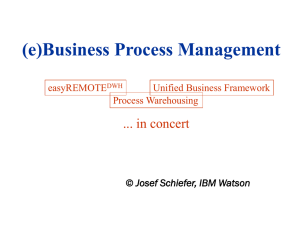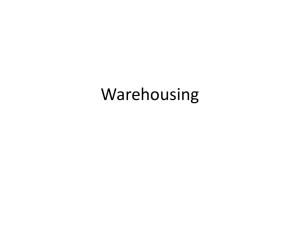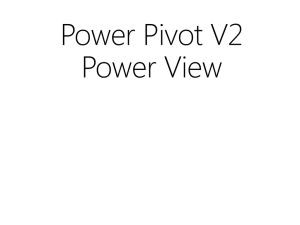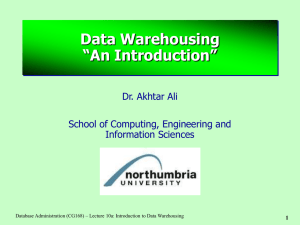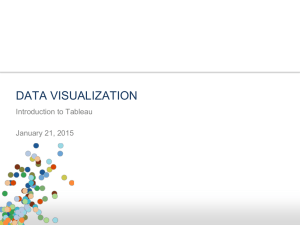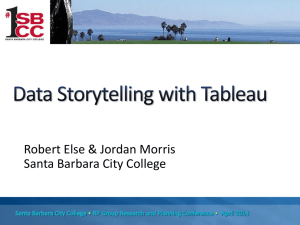Business Intelligence on a Budget Presentation (Slides)
advertisement
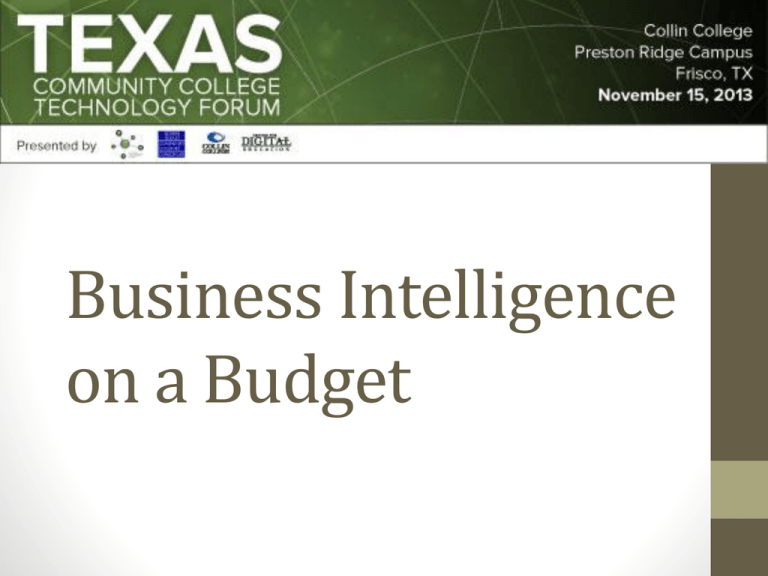
Business Intelligence on a Budget • • • • • Born in Texas, Raised in Oklahoma Undergrad from OU MBA from Texas A&M Married with 4 Kids, 2 Boys and 2 Girls Ranging from 19 Years Old to 7 Years Old • 7 Years Working at Collin College • Before That, 2 Years at the University of Central Oklahoma • 14 Years of Combined Experience with BI, CRM, and SFA Solutions About Me Christopher Frost About Me My Life as a Series of Graphs Kids 25 20 15 10 5 0 Years Till College Graduation Years Old Jobs Collin UCO UPS MCI AA About Me My Life as an Infographic • What stories does your data tell about you? • Digital Footprint • What stories do you want data to tell you? • Student success factors • Outcome metrics • Interest in programs and courses offered About Data Drowning in a Sea of Data PROS • Central Repository of Information • Secure • Backed Up • Available to Authorized Users CONS • Data Might Be Hard to Access • Limited QA • IT Might Be Tracking Data You Don’t Need & Ignoring Data You Do Need About Data IT as a Librarian • Wikileaks • School Performance http://schools.chicagotribune.com/ • Comparative School Data http://projects.propublica.org/schools/ About Data Power of Stories • End users are more sophisticated • Want more access to the raw data • Want to tell their own stories About Data Rules are Changing… …to this About Data Moving from this… • “I don’t know what I want, but I’ll know it when I see it.” • People are wired to react to visuals • Things are moving from static reports to interactive dashboards • OLAP cubes allow users to dig into the total numbers and look at underlying trends • This ability to dig deeper allows us to tell better, more accurate stories. About Data From Reports to Dashboards • Pentaho • Microsoft’s SharePoint / SSRS • Oracle’s OBIEE / Oracle Answers • SPSS • Cognos Data Tools Sophisticated BI Systems • Tableau Public Data Tools Budget-Minded BI Solutions • Did anyone bring a spreadsheet to share? SHORTCOMINGS OF TABLEAU PUBLIC • Free version means the data is public for everyone. • Don’t share if you care about privacy. • Limited to 100,000 rows. Data Tools Tableau Public Demo • Tableau Public • ??? Data Tools Budget-Minded BI Solutions • Is the One Used Most Often - Microsoft Excel … and PowerPivot Can Make It Much Better Data Tools Most Powerful BI Tool • Tableau Public • Microsoft Excel • PowerPivot Data Tools Budget-Minded BI Solutions Data Tools Setting Up PowerPivot Data Tools Setting Up PowerPivot Data Tools Setting Up PowerPivot • Work with Large Data Sets • Combine Data from Different Data Sources • However Only Inner Joins Allowed • Easy to Set Up Dashboard-Style Views • Slicers Make It Easy to Visually Filter Data • Use DAX to Create Calculated Columns on the Fly • Working with Dates (i.e. YEAR(H2)) Data Tools PowerPivot Features Data Tools PowerPivot Features Data Tools PowerPivot Features • Did anyone bring a spreadsheet to use? Data Tools PowerPivot Demo • With the Data Tab and Get External Data Data Tools How Can I Get to the Data? • Can Use Excel to Access the Following Data: • Access Databases • SQL Server Databases • CSV Files • Text Files • XML Files Data Tools How Can I Get to the Data? • Can Also Use Excel to Query Data in: • Oracle Databases • mySQL Databases However, They Require Special Drivers and Client Installs Before They Can Be Used Data Tools How Can I Get to the Data? • Metadata is the data about your data • Can use this as a roadmap to identify those elements that you are interested in • Metadata already exists inside of your database as column comments, datatypes, and table comments. • Best to document metadata as you create new tables or modify existing ones. Data Tools Mining the Metadata • Tableau Public • Microsoft Excel • PowerPivot • Oracle Data Modeler 4.0 Data Tools Budget-Minded BI Solutions • Oracle Data Modeler 4.0 Demo Data Tools Mining the Metadata End Result: • Glossary of Available Data Sources • Security Defined via an Object’s Associated Roles • Data Element Dictionary BEST OF ALL • It’s easily updatable since it sits along side your data. Data Tools Mining the Metadata • Biggest issue isn’t technical. It’s functional. • Data owners are justifiably protective of their area’s data. • Need assurances and safeguards in place to prevent data from being misused. Data Processes Roadblocks to Data Access For Example: • Student needs assurances that Personally Identifiable Info isn’t going leak out • Finance needs confidentiality on cost center authorizations • HR needs assurances that performance-related comments don’t become public Data Processes Roadblocks to Data Access • IT works with a wide variety of areas • Can facilitate two-way conversations between departments on shared data • What data do you want? • What data are you willing to share? • What concerns do you have about sharing data with others? • Start small and build trust between user communities over time. Data Processes IT as Matchmaker • Can Set Up Views of the Data that Filter Out Sensitive Info • Use a Surrogate Key for Granularity • Associate Views with Security Appropriate Roles and User Accounts Data Processes Balancing Access with Security PUBLIC ADMIN ASSISTANTS DEANS VPs Registration Reports Enrollment Reports Course Schedule Section Info Outcomes and Retention Info Program Effectiveness Early Warning Systems Learner Info Access to Everything Data Processes Balancing Access with Security • Can Set Up Views of the Data that Filter Out Sensitive Info • Use a Surrogate Key for Granularity • Associate Views with Security Appropriate Roles and User Accounts Data Processes Balancing Access with Security • Views against Source Data and Working with Spreadsheets will only Get You So Far • Building a Data Warehouse Takes Planning, But Isn’t Rocket Science • Data Warehouse = Source Data through Time • Clumping Data Together in Denormalized Structures • Basically, Turning 4000+ Tables into a Dozen Tables that Fit Together Data Warehousing Build a Data Warehouse? • Greater Performance since Totals are Often Preaggregated at a Granular Level • Tables Can Be Optimized via Range or Hash Partitioning • Calls to the Source System are Reduced by Having a Reporting System Available Data Warehousing Advantages Data Warehousing Data Warehousing Data Warehousing Data Warehousing Data Warehousing Data Warehousing • Facts are your numeric data, your measures • Level of detail on the fact table is the grain • Facts are joined to dimensions in the star schema • Dimensions provide context for facts • They are used for filtering queries or reports • Dimensions control the grouping of facts when you run the totals Data Warehousing Data Warehousing • How will you deal with slowly changing dimensions? • Will you.. • Overwrite the data • Or load the new value while “inactivating” the old value • Most have a mixture, depending on the importance of that historical info. Data Warehousing Questions to Ask • Start Small, Add On When You Can • Avoid Inner Join Conditions • Be Careful with NULL Values • Look at Count Comparisons and Time Values to Validate the Accuracy and Timeliness of the Data • Don’t Be Afraid to Start Over. Things Change and Sometimes the Data Warehouse Needs to Reflect That Data Warehousing Lessons Learned • The two great masters of data warehousing are Ralph Kimball and William Inmon. Any of the books below are great starting points. Final Points Further Reading • I would also highly recommend Lawrence Corr and Chris Adamson. Both represent the best of the new ideas in data warehousing. Final Points Further Reading • Tim Smith teaches a great BI Certificate Course at our Courtyard campus. However, there are lots of good BI programs out there. Final Points Or Training • Have a great day! • A copy of this presentation will be available on www.savvybi.com. Final Points Thanks for Attending
